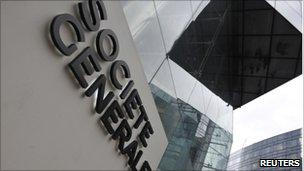Can a ban on speculation strengthen Europe's banks?
- Published
- comments

Shares in bank Societe Generale saw sharp falls
There is a risk that the temporary ban on the short-selling of shares in banks by regulators in France, Italy, Spain and Belgium will achieve the opposite of what is intended.
Short-selling is when an investor sells shares in a company they don't actually own, in the hope that the share price will fall and the shares can be bought back cheaper, to yield a profit.
It's an aggressive bet that shares are falling.
The temporary European ban, announced last night, comes in the wake of dramatic falls in the share prices of European banks, especially those of Italy and France - where on Wednesday the shares in one giant bank, Societe Generale, were more than a fifth lower at one stage.
Now because falls in share prices of that magnitude can bash the confidence of those who lend to banks, they threaten the viability of those banks - so a temporary ban can be seen as a sensible calming measure, if it reduces the volatility of bank share prices.
But if the ban is viewed as a panicky measure by eurozone authorities to provide temporary respite to financial institutions that are not as strong as they might be, then conventional investors in banks - and their creditors - would feel under greater pressure to remove their financial support from those banks.
Here are three other reasons why the ban may not work.
1) It is not clear that the recent falls in the prices of Unicredit of Italy, Soc Gen of France and so on were the consequence of short-selling by speculators rather than by conventional investors.
2) When short-selling has been temporarily banned in other jurisdictions, it has led to increased volatility in share prices (the reverse of what was wanted), because it has tended to deter certain kinds of institutions, such as hedge funds, from participating in the relevant markets. In other words, liquidity in those markets, the availability of cash for purchases and sales, has been reduced.
3) The ban relates only to short-selling in France, Italy, Spain and Belgium. But the relevant banks' shares are also traded in big international markets, such as the UK and Wall Street, where short-selling is still allowed. So the prohibition won't in theory prevent hedge funds and other investors short-selling French and Italian banks, for example, through offshore exchanges.
Here's a bit of history that isn't encouraging.
On 18 September 2008, the UK regulator, the Financial Services Authority, introduced a temporary ban on the short-selling of bank and financial shares. Within days, Bradford & Bingley collapsed and was nationalised, and that was followed in mid-October by the taxpayer rescues of Royal Bank of Scotland and HBOS/Lloyds.
Few would argue that the eurozone's banks are as weak as many international banks were in 2007-8. But precedent suggests a short-selling ban does not change the fundamentals.